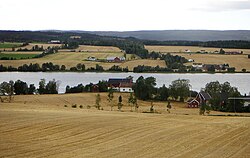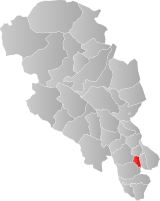Eina (municipality)
Eina Municipality Eina herred | |
|---|---|
 View of the lake Einavannet and surrounding farmland | |
 Oppland within Norway | |
 Eina within Oppland | |
| Coordinates: 60°37′43″N 10°35′55″E / 60.62864°N 10.59863°E | |
| Country | Norway |
| County | Oppland |
| District | Toten |
| Established | 1 Jan 1908 |
| • Preceded by | Vestre Toten |
| Disestablished | 1 Jan 1964 |
| • Succeeded by | Vestre Toten |
| Administrative centre | Eina |
| Area (upon dissolution) | |
| • Total | 104 km2 (40 sq mi) |
| Population (1964) | |
| • Total | 1,591 |
| • Density | 15/km2 (40/sq mi) |
| Time zone | UTC+01:00 (CET) |
| • Summer (DST) | UTC+02:00 (CEST) |
| ISO 3166 code | NO-0530[1] |
Eina is a former municipality in the old Oppland county, Norway. The 104-square-kilometre (40 sq mi) municipality existed from 1908 until its dissolution in 1964. The area is now part of Vestre Toten Municipality in the traditional district of Toten. The administrative centre was the village of Eina.[2]
History[edit]
The municipality of Eina was established on 1 January 1908 when the old Vestre Toten Municipality was divided in three. The southwestern part (population: 1,173) became Eina Municipality, the southeastern part (population: 2,412) became Kolbu Municipality, and the northern part (population: 4,027) continued as Vestre Toten Municipality. During the 1960s, there were many municipal mergers across Norway due to the work of the Schei Committee. On 1 January 1964, Eina Municipality (population: 1,591) was merged with Vestre Toten Municipality (population: 9,113) plus the Sørligrenda area of Vardal Municipality (population: 87) and the small area on the south end of the lake Einavatnet (population: 12) from Gran Municipality to form a new, larger Vestre Toten Municipality.[3]
Name[edit]
The municipality (originally the parish) is named after the lake Einavatnet (Old Norse: Eini). The name of the lake is derived from the word einir which means "juniper", likely referring to the vegetation around the lake.[4][2]
Government[edit]
While it existed, this municipality was responsible for primary education (through 10th grade), outpatient health services, senior citizen services, unemployment, social services, zoning, economic development, and municipal roads. During its existence, this municipality was governed by a municipal council of directly elected representatives. The mayor was indirectly elected by a vote of the municipal council.[5]
Municipal council[edit]
The municipal council (Herredsstyre) of Eina was made up of 13 representatives that were elected to four year terms. The party breakdown of the final municipal council was as follows:
| Party name (in Norwegian) | Number of representatives | |
|---|---|---|
| Labour Party (Arbeiderpartiet) | 5 | |
| Christian Democratic Party (Kristelig Folkeparti) | 2 | |
| Centre Party (Senterpartiet) | 6 | |
| Total number of members: | 13 | |
| Note: On 1 January 1964, Eina became part of Vestre Toten Municipality. | ||
| Party name (in Norwegian) | Number of representatives | |
|---|---|---|
| Labour Party (Arbeiderpartiet) | 5 | |
| Communist Party (Kommunistiske Parti) | 1 | |
| Christian Democratic Party (Kristelig Folkeparti) | 2 | |
| Farmers' Party (Bondepartiet) | 5 | |
| Total number of members: | 13 | |
| Party name (in Norwegian) | Number of representatives | |
|---|---|---|
| Labour Party (Arbeiderpartiet) | 5 | |
| Farmers' Party (Bondepartiet) | 6 | |
| Liberal Party (Venstre) | 1 | |
| Total number of members: | 12 | |
| Party name (in Norwegian) | Number of representatives | |
|---|---|---|
| Labour Party (Arbeiderpartiet) | 4 | |
| Communist Party (Kommunistiske Parti) | 1 | |
| Farmers' Party (Bondepartiet) | 6 | |
| Joint list of the Liberal Party (Venstre) and the Radical People's Party (Radikale Folkepartiet) | 1 | |
| Total number of members: | 12 | |
| Party name (in Norwegian) | Number of representatives | |
|---|---|---|
| Labour Party (Arbeiderpartiet) | 4 | |
| Communist Party (Kommunistiske Parti) | 1 | |
| Christian Democratic Party (Kristelig Folkeparti) | 2 | |
| Farmers' Party (Bondepartiet) | 5 | |
| Total number of members: | 12 | |
| Party name (in Norwegian) | Number of representatives | |
|---|---|---|
| Labour Party (Arbeiderpartiet) | 4 | |
| Farmers' Party (Bondepartiet) | 8 | |
| Total number of members: | 12 | |
| Note: Due to the German occupation of Norway during World War II, no elections were held for new municipal councils until after the war ended in 1945. | ||
Mayors[edit]
See also[edit]
References[edit]
- ^ Bolstad, Erik; Thorsnæs, Geir, eds. (26 January 2023). "Kommunenummer". Store norske leksikon (in Norwegian). Kunnskapsforlaget.
- ^ a b Mæhlum, Lars, ed. (29 March 2022). "Eina". Store norske leksikon (in Norwegian). Kunnskapsforlaget. Retrieved 14 October 2022.
- ^ Jukvam, Dag (1999). Historisk oversikt over endringer i kommune- og fylkesinndelingen (PDF) (in Norwegian). Statistisk sentralbyrå. ISBN 9788253746845.
- ^ Rygh, Oluf (1900). Norske gaardnavne: Kristians amt (in Norwegian) (4 ed.). Kristiania, Norge: W. C. Fabritius & sønners bogtrikkeri. p. 104.
- ^ Hansen, Tore; Vabo, Signy Irene, eds. (20 September 2022). "kommunestyre". Store norske leksikon (in Norwegian). Kunnskapsforlaget. Retrieved 1 January 2023.
- ^ "Kommunevalgene og Ordførervalgene 1959" (PDF) (in Norwegian). Oslo, Norge: Statistisk sentralbyrå. 1960.
- ^ "Kommunevalgene og Ordførervalgene 1955" (PDF) (in Norwegian). Oslo, Norge: Statistisk sentralbyrå. 1957.
- ^ "Kommunevalgene og Ordførervalgene 1951" (PDF) (in Norwegian). Oslo: Statistisk sentralbyrå. 1952.
- ^ "Kommunevalgene og Ordførervalgene 1947" (PDF) (in Norwegian). Oslo: Statistisk sentralbyrå. 1948.
- ^ "Kommunevalgene og Ordførervalgene 1945" (PDF) (in Norwegian). Oslo: Statistisk sentralbyrå. 1947.
- ^ "Kommunevalgene og Ordførervalgene 1937" (PDF) (in Norwegian). Oslo: Statistisk sentralbyrå. 1938.
- ^ Gjørvad, Olav, ed. (1937). Totens bygdebok (in Norwegian). Vol. 2. Oslo, Norge. pp. 149–150.
{{cite book}}: CS1 maint: location missing publisher (link)


 French
French Deutsch
Deutsch